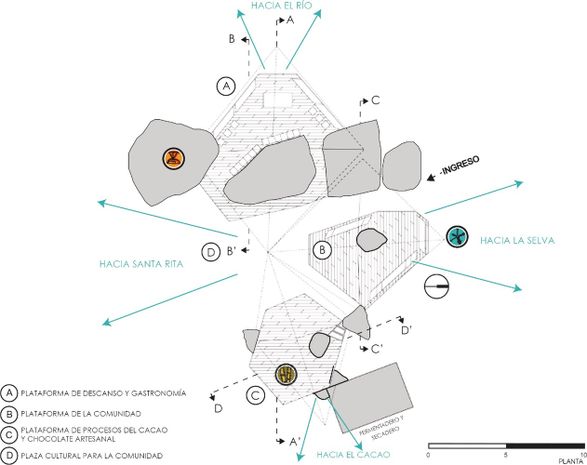
Cacao Interpretation Center
CACAO INTERPRETATION CENTER
Taller Con Lo Que Hay 4 + ENSUSITIO Arquitectura
ARCHITECTS
Ensusitio Arquitectura, Taller Con Lo Que Hay 4
ENGINEERING
Patricio Cevallos
COLLABORATION
Ensusitio Arquitectura,cynthia Ayarza
CHOCOLATES PACARI
Santiago Peralta, Carla Barboto, Gabriela Paredes
SANTA RITA COMMUNITY PRESIDENT
Bolívar Alvarado
COMPOST TOILET ADVISOR
Red Ecosur- Ing Paul Moreno
STUDENT TEAM
Taller Con Lo Que Hay 4 (Carlos De La Torre, Xavier Duque, Diego Gaibor, Francisco Garcia, Pavel Guerron, Nataly Moreno, Emilia Pallares, Pablo Perez, Andrea Puertas, Maria Mercedes Reinoso )
MICHIGAN UNIVERSITY VOLUNTEERS
Ana María Durán, Ellen Duff, Hillary Davlin, Victoria Mcgovern
SOCIOLOGIST
David Jara
TUTOR
Enrique Villacis Tapia
YEAR
2014
LOCATION
Archidona, Ecuador
CATAGORY
Community Center
QUICHUA AMAZÓNICA DE SANTA RITA COMMUNITY (ECUADOR)
Cacao Interpretation Center is a space for the Kichwa community of Santa Rita, intended for the analysis, dissemination and understanding of their culture, traditions and especially cacao processes from cultivation to becoming the best chocolate in the world.
In late 2012 the company Chocolates Pacari felt the need to bring the final chocolate consumer with the very beginning, not as an act of marketing, but to show community and traditional processes involving cultivation and manufacturing.
This project is a collaborative effort of the community with the Pacari chocolate company, Taller Con lo que Hay from PUCE-FADA and the office ensusitio arq.
“Con lo que hay” is an academic architecture studio within FADA-PUCE Quito, for levels seven and eight as a pre-professional opportunity where students ultimately apply their academic knowledge along with social work within a specific community.
The workshop includes from diagnosis, analysis, conceptualization, design and participatory architectural construction themes, to the design and publication of manuals for use by the population where they intervene.
The project consists of three platforms, the access and welcoming platform where the community will have the chance to show and produce their crafts, the second, to discover the culinary culture and consists of an open fire to share where every tourist can make their own chontacuro maito and carachama, traditional local fare; and finally the platform that shows the processes of cacao, which contains a sample of drying, fermentation and roasting processes, where finally one has the possibility of making handmade chocolate.
All this infrastructure is built on the principles of "what there is", that is, traditional materials and local knowledge, and our easily replicable technological contributions to value even more the ancestral, setting it in a contemporary context.
All structures are built on huge rocks discovered on the site, thus developing a simple and replicable using technology which uses the stone as foundation and generating the particular structure of the project.
Everything else is built with local materials and technology; bamboo cane structure, rattan ties covered with straw, and chonta and chuncho floors.
Pacari activates the site with training on the sustainable management of cacao and community tourism, and Con lo que Hay provides a manual publication in which the community can be supported to replicate traditional materials based on their contemporary technologies and building systems, as applied in the project.
EMPOWERMENT
This project aims to create collaborative networks where everyone wins but without generating dependencies. So that each actor plays an important dependent but not indispensable role.
The important thing about this process is that we are not direct participants as designers but at the request of the community we are advisers in their processes, so they are taking power of their decisions but with a technical and responsible support.
THE LEGACY, TO KNOW WHEN TO EXIT
From the end of the academic year, “taller con lo que hay” has continued to monitor the project, this time overseeing its development by Ensustio Arquitectura, empowering the student again.
Likewise, the workshop has left the country to tell of its experience within the TAU (Urban Activation Workshop, San Jose, Costa Rica), thus they are not only recipients but issuers of experiences. At present the project is enriched with every visit of tourists and connoisseurs of chocolate processes. It is very gratifying to see how the community appropriates the infrastructure, giving it the necessary and specific uses, making it grow and mutate.



















